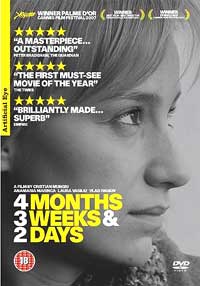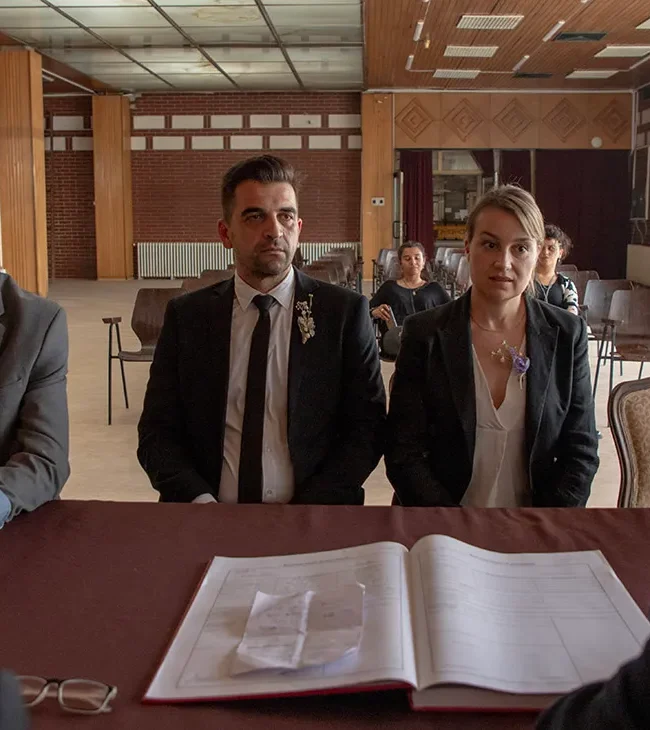
(Buy 4 Months, 3 Weeks and 2 Days at Amazon and visit the film’s IFC page to watch the trailer.)
It’s Bucharest, 1987; the Ceausescu regime is entering its final days and Otilia (Anamaria Marinca) has a problem. A college student with limited resources scraping by on the black market in between classes and the attentions of her boyfriend, Otilia has been handed a whole new set of responsibilities by her roommate, Gabita (Laura Vasiliu). The plans are all in place; a reservation at a not-too-expensive hotel, the proper contacts made with certain shady characters and just the right amount of time available to ensure privacy. All that Otilia and Gabita have to do is execute their plan to the letter and maybe, just maybe, the problem will be solved and they can return to their normal lives. It’s a risk worth taking; Gabita is pregnant and wants to terminate the pregnancy, but it’s Bucharest, it’s 1987, the Ceausescu regime is entering its final days and abortion is illegal.
Cristian Mungiu’s thrilling drama 4 Months, 3 Weeks and 2 Days shows us the terrifying day in question with a gripping precision and a wicked sense of humor. Squeezing every ounce of dramatic potential out of his harrowing scenario (the termination of a pregnancy by an illegal abortion provider) allows Mungiu to examine not only the issue of reproductive freedom through the trials and humiliations of his heroine, Otilia, but to explore freedom in general, to show us how the refusal of a fundamental choice ripples through everyday life, reducing each transaction into an exploitative negotiation and compromise, filling each moment with terrible danger. Interestingly enough, Mungiu’s primary focus is not on the woman receiving the abortion, the flighty and childlike Gabita, but instead on her friend Otilia, the person charged with making sure that everything goes according to plan (which, of course, it doesn’t.)
Otilia’s burden, overseeing and orchestrating her friend’s illegal abortion, is the one we share. Mungiu keeps the story and camera with Otilia almost exclusively, allowing the Director to brilliantly set the table for all types of terrible violence and tragedy; Otilia discovers a pocket knife among the abortion provider’s personal effects (filling the entire film with dread), we hear the man describe the possible (and seemingly inevitable) complications that could arise from the procedure itself (hemorrhaging, hours and days of potential suffering) and we soon discover that he left his identification behind with the girls, throwing his identity into doubt while simultaneously worrying us that he may actually return to collect his identification. And then, Otilia leaves for a rendezvous with her boyfriend and his snobby parents, closing the door on the hotel room and leaving our imaginations to run wild as the clock ticks behind the locked door.
As these moments unbearably pile on top of each other, Mungiu’s brilliant decision to use Otilia’s perspective pays off spectacularly. Mungiu is neither the first nor the last of this incredible generation of Romanian filmmakers to play with the classical rules of narrative manipulation, but 4 Months is probably the most effective thriller in years precisely because the Director’s dedication to his character’s point of view is so disciplined. This seems to be a popular strategy among this generation; from Cristi Puiu’s evolution from his previous film, the recently screened Stuff and Dough (a claustrophobic story around the impending violence inherent in a slow rolling car chase from a small town in the countryside to big city Bucharest) to his lock step death march with Dante Lazarescu in The Death Of Mr. Lazarescu, to Mungiu’s deep identification with Otilia in 4 Months, what this emerging national cinema seems to have learned (perhaps from Robert Bresson or his disciples the Dardenne Brothers) is how deep emotional identification can deliver the most powerful of messages. Just keep the stakes rising, insert a few never-to-be resolved red herrings and we’re with you all the way.
It is no surprise at all that the tensions of a Dardenne-style social realism and the MacGuffins and unseen horrors of Hitchcock’s brand of thriller would work so well together, but Mungiu makes certain by leaving no anxiety unexposed, no outrage unspoken. What heightens the life and death stakes of the film into the cinematic stratosphere is, of course, the outrageousness of the situation from the get-go; without access to benefits of reproductive freedom, an operation that should be performed safely and cleanly by a medical professional becomes a horror show. Anxiety is bad enough, but coupled with the outrage and anger at the situation (an anger that Mungiu clearly expresses through Otilia’s point of view), the tension is at times unbearably brilliant. The women in the film make some costly mistakes (Gabita’s casual approach to the details of her agreement proves especially frustrating), but one can’t help wondering why they should have had to experience this at all. As the right to choose an abortion is continually evaluated in the political context of a world where feminism’s hard-won victories seem commonplace, the film provides a painful reminder of the indignities suffered when politics and morality are imposed on the private decisions of individuals. Gabita’s choice to not become a mother, as late as it arrives in the process, is as difficult and painful a decision as could be made, but it is Otilia’s experience, that of a woman forced into the role of a criminal for facilitating that choice, that allows the film to escape the clichés of a cautionary tale and transcend as great drama.
The DVD of this film, released by Genius Products, is a good transfer that includes a couple of interviews with Director Mungiu and cinematographer Oleg Mutu, as well as an interesting (if slight) documentary about the making of the film. The film just saw its limited release in January of 2008, and seeing as how the film rolled out slowly in theaters (despite a national VOD launch via IFC Films’ First Take), a six-month turnaround to DVD seems well in line with IFC’s stated mission of getting these films into as many homes as is possible. Regardless of how you see it, 4 Months, 3 Weeks and 2 Days is a must for all cinephiles, one of the best of this or any year.
— Tom Hall











